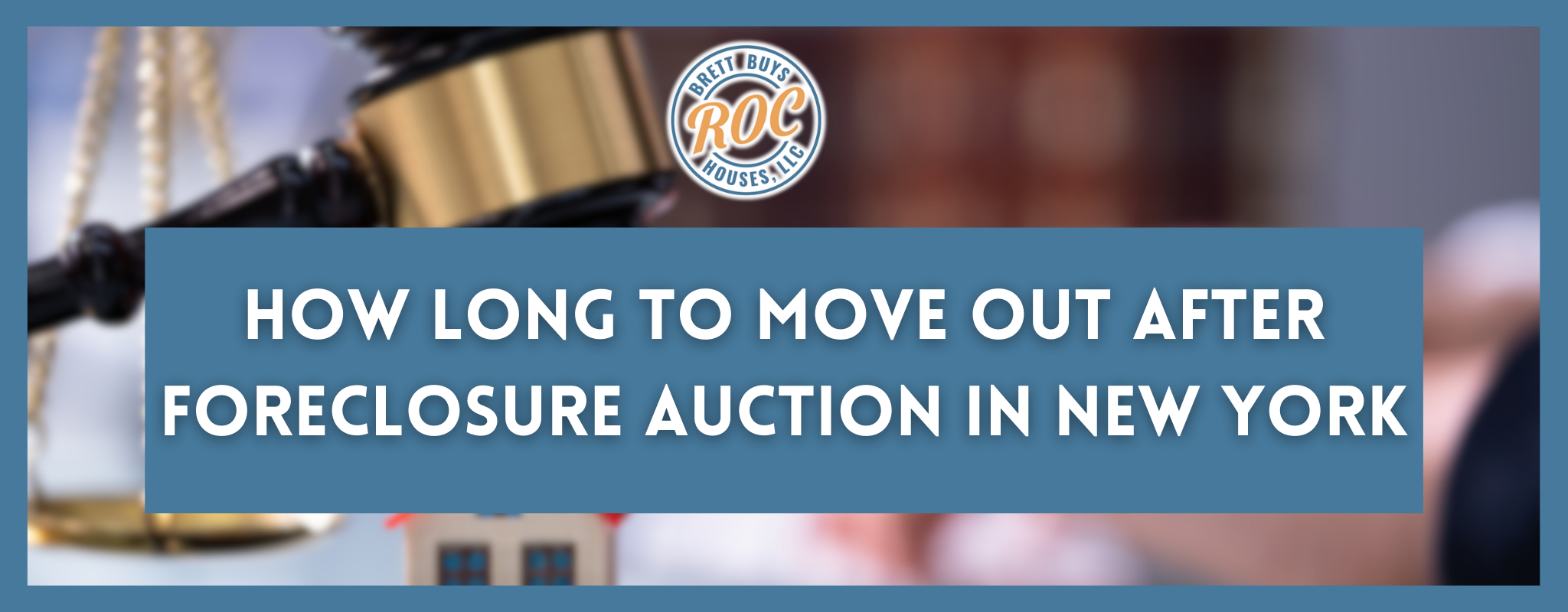
What Is the Timeline for Moving Out After a Foreclosure Auction in New York?
In New York, leaving after a foreclosure auction entails several steps. When a property is sold at a foreclosure auction, the new owner must wait for the court to approve the sale. This process can take anywhere from a few days to several weeks. Once the sale is completed, the new owner gives the former homeowner an official notice to vacate the property.
There may be a grace period, but it is not always guaranteed and depends on negotiations with the new owner. Knowing the foreclosure process timeline in New York allows homeowners to plan their next steps after the auction.
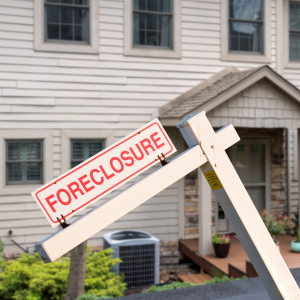
What Happens Immediately After the Auction Ends?
After a foreclosure auction, the successful bidder must complete the purchase. In New York, this entails completing payments and receiving legal ownership documents. The new owner does not receive the property immediately; they must wait for the court to confirm the sale before it becomes legally binding.
Once the sale is finalized, the new owner can take possession of the property. For the current homeowner, this means getting ready to leave. If they do not leave, the new owner may initiate the legal eviction process by serving a notice to the homeowner and, if necessary, obtaining a court order for eviction.
Is There a Redemption Period for Homeowners in New York?
Unlike some states, New York has no redemption period after a foreclosure sale. A redemption period would allow homeowners to reclaim their property by paying what they owe plus fees following the auction. This option is unavailable in New York, so homeowners should know this.
Although there is no redemption period following the auction, homeowners can look into other options before the auction. This could include negotiating with the lender or contemplating a short sale. Understanding the outcomes of a foreclosure auction and their options can assist homeowners in better managing this difficult time.
How Tenant Rights Are Protected After Foreclosure
Foreclosure can be stressful for tenants in impacted properties. Understanding tenants’ rights after foreclosure is critical, especially given New York foreclosure laws. These laws protect tenants from being unfairly evicted after a foreclosure auction. During these difficult housing situations, tenants should know their legal rights.
What Notices Are Required for Tenants Living in Foreclosed Properties?
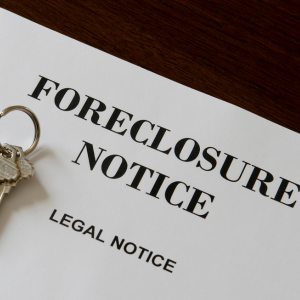
Tenants in foreclosed properties must be given proper notice to vacate following foreclosure. In New York, eviction notices must adhere to the state’s legal procedure. This includes a specific eviction notice period, which allows tenants to respond or prepare. Tenants who stay after a foreclosure sale must be informed about their rights and the legal procedures for receiving notices.
How Long Do Tenants Have to Move After a Foreclosure Sale?
Tenants frequently wonder how long they can stay in a foreclosed property. The grace period following a foreclosure auction varies, but New York has specific deadlines for moving out after foreclosure. A typical vacate notice period gives tenants time to plan their relocation after foreclosure. Understanding the eviction process after foreclosure in New York, including the NY foreclosure eviction timeline, allows tenants to plan accordingly. Those seeking eviction defense or foreclosure strategies should know the resident eviction protocols following foreclosure.
Contact property experts such as Brett Buys Roc Houses LLC for advice and support during these transitional periods.
Legal Steps for Eviction Following a Foreclosure Auction
Handling an eviction following a foreclosure auction in New York can be complicated. New and former homeowners must understand the eviction process timeline and the specific New York foreclosure and eviction laws.
What Is the Process for Filing an Eviction Case in New York?
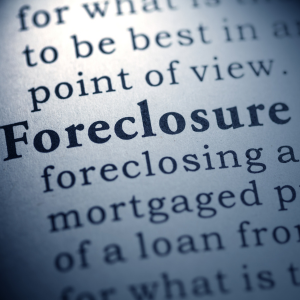
Here is a straightforward breakdown of filing an eviction case in New York:
- Gather Required Documents: Before going to court, organize all foreclosure documents and tenant agreements.
- Submit the Case to NY Housing Court: File the necessary eviction paperwork with the appropriate New York housing court. This officially kicks off the eviction process.
- Issue an Eviction Notice: In New York, you must give tenants an eviction notice well before court proceedings. The notice period can vary, so follow local rules carefully.
- Attend the Court Hearing: Be ready to present your case to a judge who will consider the foreclosure details and the occupants’ rights.
Following these steps, you can proceed with the eviction process following a foreclosure auction while adhering to New York eviction laws.
How Can Homeowners Challenge an Eviction Post-Foreclosure?
There are several steps that homeowners can take to contest an eviction after foreclosure:
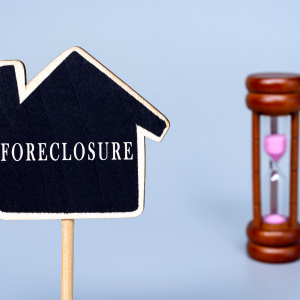
- Defend Against Foreclosure Eviction: Homeowners can challenge the eviction by questioning the foreclosure’s legality or how the auction was conducted. Legal advice can assist in identifying potential defenses.
- Right to Remain Temporarily Post-Foreclosure: Some laws may grant former homeowners temporary permission to stay on the property during eviction, giving them more time to find new living arrangements.
- Understand Rights in Foreclosure: Knowing your rights can help homeowners contest certain aspects of the eviction process if errors occur.
Engage with these options under New York foreclosure laws and seek legal counsel if necessary. Exploring these options can help a homeowner improve their situation and prolong their stay.
Brett Buys Roc Houses LLC is dedicated to guiding people through the eviction process following a foreclosure auction and providing support and resources to those who are affected.
Financial Options and Resources After Foreclosure
Are There Assistance Programs Available for Displaced Homeowners in New York?

Several assistance programs are available to New York homeowners facing foreclosure to help them during this difficult time. These programs facilitate the transition from foreclosure, allowing homeowners to manage the mortgage foreclosure process better.
The New York State Mortgage Assistance Program is a useful resource. It provides loans to qualified homeowners to cover late payments and other debts that could result in foreclosure. This program is part of a larger effort to offer foreclosure relief options tailored specifically to New York residents.
Another useful resource is the Home Affordable Modification Program (HAMP). Although it is a federal initiative, it benefits New York homeowners by providing mortgage modifications that make payments more manageable.
Exploring these resources as soon as possible can be highly beneficial. Homeowners can seek personalized advice and assistance from local housing counseling agencies. These organizations monitor available foreclosure assistance programs and work with individuals to develop strategies tailored to their needs.
Can Homeowners Negotiate with the Lender Post-Auction?

Following a foreclosure auction, homeowners may have the opportunity to negotiate with lenders. Understanding your legal rights during a foreclosure auction is essential for maximizing negotiation opportunities.
Homeowners should be aware that negotiating after the auction requires open lines of communication with their creditors. Although the property has been sold, some lenders will discuss settling outstanding mortgage balances if it is financially beneficial.
Before beginning foreclosure negotiations, homeowners should carefully review their rights. A foreclosure attorney can advise them on their rights and potential legal strategies.
Direct communication with the lender can reveal ways to settle outstanding financial obligations. For example, you could negotiate a deficiency waiver to reduce or eliminate the mortgage balance.
Seeking legal counsel enables you to understand your options and negotiate effectively. With the right guidance, homeowners can find solutions to alleviate financial stress and rebuild credit after a foreclosure.
Understanding the Impact of Foreclosure on Credit and Future Housing
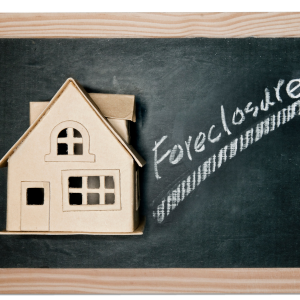
Foreclosure can seriously impact your credit score and future housing options. When a house is foreclosed on, your credit score usually suffers, making it difficult to obtain loans or buy a new home. Understanding how foreclosure affects your financial situation lets you make more informed decisions about what to do next.
How Does Foreclosure Affect Your Ability to Buy Another Home?
Foreclosures remain on your credit report for seven years, making it difficult to purchase another home. Lenders evaluate your credit history for risk; foreclosure is a black mark. When you go to buy another home, you may have to pay higher interest rates or make a larger down payment. On the other hand, some government-funded programs may offer options sooner if you meet certain requirements.
What Steps Can Be Taken to Rebuild Credit After Foreclosure?
Rebuilding credit after a foreclosure is critical for long-term financial stability and housing options. Here are some actions you can take:

- Review Your Credit Report: Collect copies from all three major bureaus. Examine for accuracy and errors.
- Pay Bills On Time: Paying bills on time can gradually improve your credit score.
- Reduce Outstanding Debt: Pay off high-interest debts first.
- Consider Secured Credit Cards: Responsible use of a secured credit card can help rebuild your credit.
- Monitor Progress: Regularly monitor your credit score and reports to identify improvements and early issues.
These steps can help you recover your credit after foreclosure, allowing you to regain financial stability and improve your future housing options. During this rebuilding period, patience and persistence are essential.
FAQs:
How long do I have to move out after a foreclosure auction in New York?
New York, homeowners usually have 90 days to vacate after a foreclosure auction. This period can vary based on individual circumstances. Understanding your rights is important, so consulting a legal expert might be helpful.
Can I be evicted immediately after a foreclosure sale in New York?
No, immediate eviction is not typical in New York. The new owner must follow legal eviction procedures if the owner occupies the property. It’s wise to consult an attorney for advice on your specific situation.
What happens if I don’t leave my foreclosed home by the eviction date?
Not leaving by the eviction date could result in additional legal actions, such as court involvement or sheriff’s eviction. It’s best to comply with the notice and seek advice about your rights as a former homeowner.
Do tenants have different rights than homeowners after a foreclosure auction?
Yes, tenants may have extra protections under New York law. They might be allowed to stay until their lease ends. Tenants should verify their rights with a tenant advocacy group or legal professional.
Can I negotiate to stay longer in my foreclosed home?
Yes, you might be able to negotiate with the new owner for more time. Ensure any agreement is documented in writing.
What are the consequences of not moving out after a foreclosure?
Staying in a property after foreclosure can lead to legal issues, possible eviction records, and financial burdens. It’s crucial to understand these consequences and get professional help.
How can I manage finances after losing my home through foreclosure?
Managing finances after foreclosure involves creating a budget and understanding your financial obligations. Financial counseling can be helpful, and there are resources to support you during this transition.
Are there legal resources available to help with foreclosure-related eviction in New York?
Yes, there are legal aid organizations that can assist with evictions after foreclosure. Professional legal advice can help you understand your rights and explore defenses against eviction.
Key Insights
- Homeowners in New York typically have 90 days to move out after a foreclosure auction, though timelines can vary due to specific NY eviction laws.
- The foreclosure process timeline includes several stages, from the initial notice to the auction, and may lead to eviction proceedings.
- Tenants facing eviction post-foreclosure sale have rights under New York foreclosure laws, such as receiving an eviction notice period before vacating.
- Seeking legal representation and exploring foreclosure relief options are crucial for understanding homeowner rights and finding alternatives to eviction, like seeking a preliminary injunction.
- Engaging in negotiation or hiring an eviction attorney in NY can provide strategies to manage the legal complexities of maintaining or regaining property possession.
- Understanding the mortgage foreclosure process can help prevent further financial issues and aid in planning for relocation after a foreclosure auction.
- Various resources and services can assist those transitioning post-foreclosure with relocation and managing the aftermath of losing a home.
- Access to information about the sheriff’s eviction process in New York and relocation after foreclosure can help individuals plan effectively to avoid unexpected legal issues.
- Knowing your tenant rights after foreclosure and potential scenarios like adverse possession after foreclosure prepares residents to handle evictions confidently.
This information applies to New York and its cities, including Brighton, Rochester, and Syracuse. For assistance or questions, please call us at 585-299-9709 or visit the Brett Buys Roc Houses LLC website for more details

